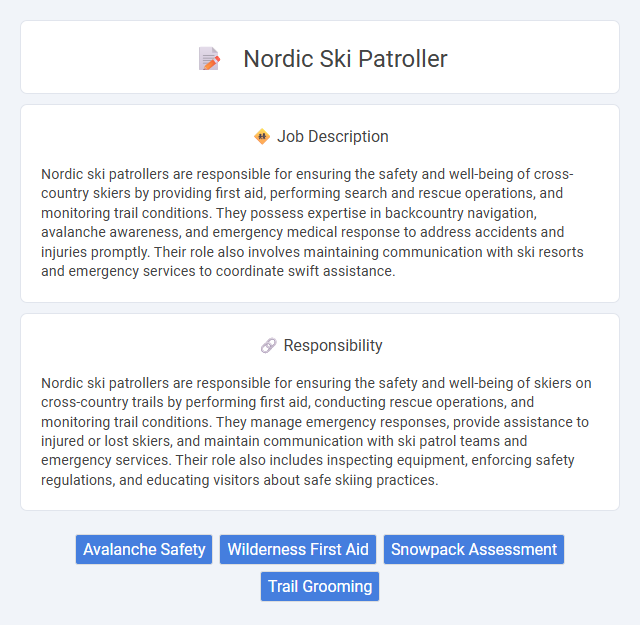
Nordic ski patrollers are responsible for ensuring the safety and well-being of cross-country skiers by providing first aid, performing search and rescue operations, and monitoring trail conditions. They possess expertise in backcountry navigation, avalanche awareness, and emergency medical response to address accidents and injuries promptly. Their role also involves maintaining communication with ski resorts and emergency services to coordinate swift assistance.
Individuals with strong physical endurance and excellent cardiovascular health have a higher probability of thriving as Nordic ski patrollers, given the demanding nature of traversing rugged, snow-covered terrain. People who possess quick decision-making skills and the ability to remain calm under pressure may be well-suited for responding to emergency situations on the slopes. Those with pre-existing musculoskeletal injuries or limited stamina might find this role challenging and less compatible with their physical capabilities.
Qualification
Nordic ski patrollers must possess advanced first aid certification, often including wilderness and avalanche rescue training, to ensure safety on remote trails. Strong physical fitness and expert skiing abilities enable rapid response in rugged terrain and variable weather conditions. Extensive knowledge of mountain safety protocols, emergency response techniques, and navigation skills are essential for effective patrolling and incident management.
Responsibility
Nordic ski patrollers are responsible for ensuring the safety and well-being of skiers on cross-country trails by performing first aid, conducting rescue operations, and monitoring trail conditions. They manage emergency responses, provide assistance to injured or lost skiers, and maintain communication with ski patrol teams and emergency services. Their role also includes inspecting equipment, enforcing safety regulations, and educating visitors about safe skiing practices.
Benefit
A Nordic ski patroller likely benefits from a dynamic outdoor work environment promoting physical fitness and mental well-being. The role probably offers opportunities to develop valuable first aid and rescue skills, enhancing career versatility. Employees may also receive access to ski facilities and potential seasonal employment advantages.
Challenge
Working as a Nordic ski patroller likely involves navigating difficult terrain and responding quickly to emergencies, which can present significant physical and mental challenges. The probability of encountering unpredictable weather conditions and varied trail difficulties means adaptability and strong decision-making skills are often essential. Continuous training and experience might be required to effectively manage safety risks and provide timely assistance on cross-country ski trails.
Career Advancement
Nordic ski patrollers gain critical expertise in avalanche control, first aid, and mountain safety, providing a solid foundation for career advancement within ski resorts and outdoor emergency services. Progression opportunities include senior patroller roles, ski area management, and specialized rescue team leadership. Continuous training in advanced medical response and terrain navigation enhances promotion potential and professional growth.
Key Terms
Avalanche Safety
Nordic ski patrollers specialize in avalanche safety through rigorous terrain assessment, snow stability evaluation, and real-time monitoring of weather conditions to prevent hazardous incidents. Their expertise includes conducting controlled avalanche detonations, implementing rescue protocols, and educating skiers on risk awareness and safe travel practices in backcountry environments. Mastery of avalanche safety technology such as transceivers, probes, and shovels is essential for effective search and rescue operations and minimizing avalanche-related casualties.
Wilderness First Aid
Nordic ski patrollers possess specialized training in Wilderness First Aid to provide critical medical care in remote, snow-covered environments. Their expertise ensures timely assessment and stabilization of injuries like hypothermia, fractures, and sprains before evacuation. Mastery of wilderness medicine protocols is essential for maintaining safety on backcountry trails and supporting rescue operations.
Snowpack Assessment
Nordic ski patrollers conduct detailed snowpack assessment to evaluate stability and identify potential avalanche risks in cross-country ski areas. They analyze layers of snow, temperature gradients, and wind effects using specialized tools and observation techniques to ensure skier safety. Accurate snowpack evaluation guides trail management decisions and informs timely warnings for snow conditions.
Trail Grooming
Nordic ski patrollers specialize in trail grooming to maintain safe, smooth, and well-defined cross-country skiing paths. They use equipment such as groomers and snowcats to compact snow, create corduroy surfaces, and track classic ski lanes, enhancing skier safety and trail enjoyment. Consistent trail grooming reduces hazards and preserves trail sustainability in varied weather conditions.
 kuljobs.com
kuljobs.com